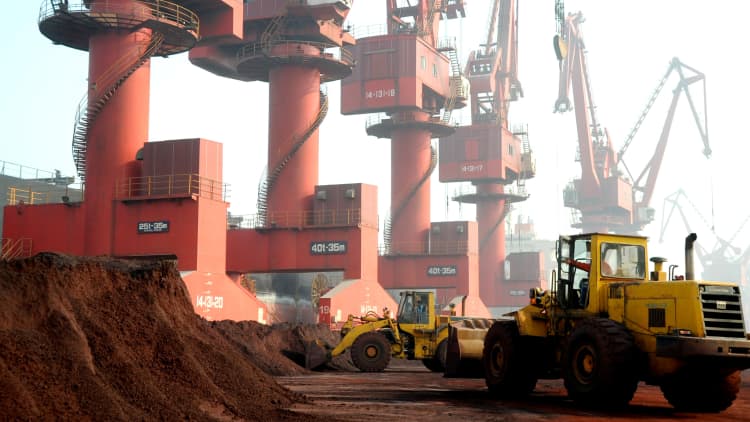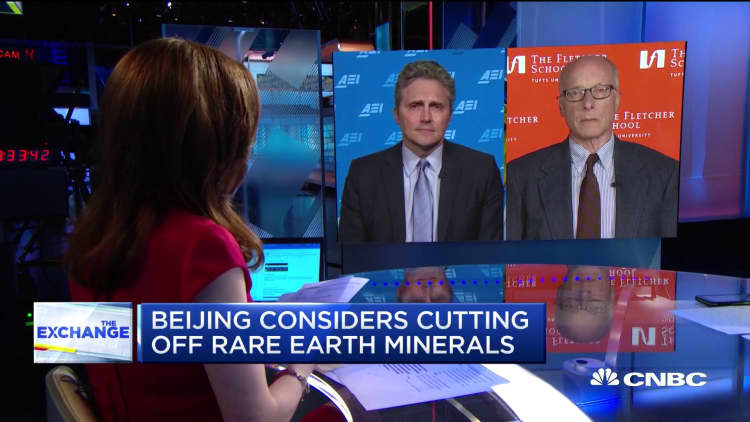China's threat to stop exporting rare earth minerals to the United States may not give Beijing much leverage in the ongoing trade war between the world's two biggest economies.
While China is the world's leading producer of rare earths — minerals found in a wide range of everyday consumer electronics — Beijing's ability to use them as a weapon is fairly limited, according to several analysts. It remains to be seen how China would structure a ban on rare earths, but some corners of Wall Street say the move wouldn't be a game changer for Beijing's trade negotiators.
"As a general premise, we are of the view that the impact on the U.S. would be mild, which is one reason why we are skeptical that Beijing would 'pull the trigger' on this particular threat," Raymond James analysts Ed Mills and Pavel Molchanov said in a research note on Monday.
The official newspaper of the Communist Party of China warned last week that Beijing could soon stop exporting rare earths to the U.S. The threat came ahead of an increase in U.S. tariffs on $200 billion in Chinese goods that went into effect this past weekend.

Rare earths are a group of 17 minerals that aren't actually rare, but are produced in fairly scarce quantities compared with abundantly mined metals like copper. They have become more important in recent years because they're increasingly used in high-tech equipment, defense manufacturing and electric vehicles.
China mined 70% of these minerals in 2018, leading some analysts last week to raise questions about the impact to U.S. industries that are reliant on rare earths. But the U.S. accounted for only 9% of global demand for rare earths that go into the manufacturing process, according to Raymond James. That means the U.S. spent only a "modest" $160 million in 2018 to import rare earths for manufacturing.
"The reason is fairly straightforward: the U.S. has only limited manufacturing capacity vis-a-vis the high-tech products that are most commonly associated with rare earths. Consumer electronics (PCs, smartphones, flat panel TVs) and various industrial goods (electric vehicle batteries, wind turbines, lasers, fiber optics) are simply not produced in the U.S. on the scale that they are in China itself and/or its Asian neighbors," Mills and Molchanov wrote.
Wells Fargo Investment Institute said the ban would put U.S. manufacturers that use rare earths in a bind, increasing production costs and even causing product delays.
But the firm also said the ban wouldn't necessarily give Beijing a trump card. That's because it's unlikely China would be able to do much more than restrict supplies of rare earths to U.S. manufacturers.
"We have a hard time seeing how China could slap rare earth restrictions on consumer goods — goods that are produced inside China and are increasingly consumed globally — and not shoot itself in the economic foot in the process," John LaForge, head of real asset strategy at Wells Fargo Investment Institute, said in a research note last week.

The impact could be greater if Beijing tries to dissuade non-U.S. companies from doing business with U.S. manufacturers that need rare earths, rather than just restricting supplies from China to American factories, Raymond James warned. However, China's past attempts to limit rare earth supplies have not been very successful, the investment bank noted.
When Beijing slashed shipments in 2010, prices for rare earths jumped, creating an incentive for other countries to increase production. The measures also destroyed demand, as manufacturers found ways to use fewer rare earth minerals in their products.
A complete ban on rare earth exports to the U.S. is not practical because American companies can secure supplies from countries such as Malaysia and Japan, although at much higher costs, an official from the Chinese Society of Rare Earths told Bank of America Merrill Lynch in a conference call.
The official noted that 80% of U.S. demand for processed rare earths is for lanthanum and cerium, both of which are oversupplied around the world.
To be sure, the effects would be felt more acutely by some industries. Raymond James noted that U.S. oil refineries use rare earths in their plants, and Bank of America Merrill Lynch said it expects the automotive sector to be most affected.


